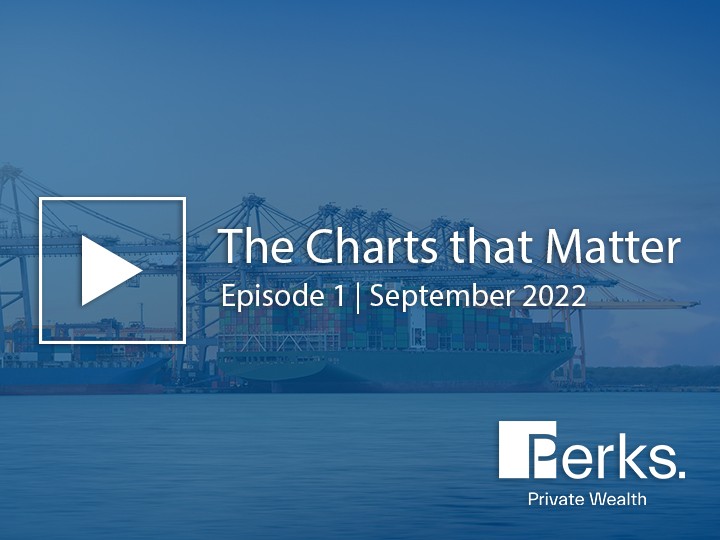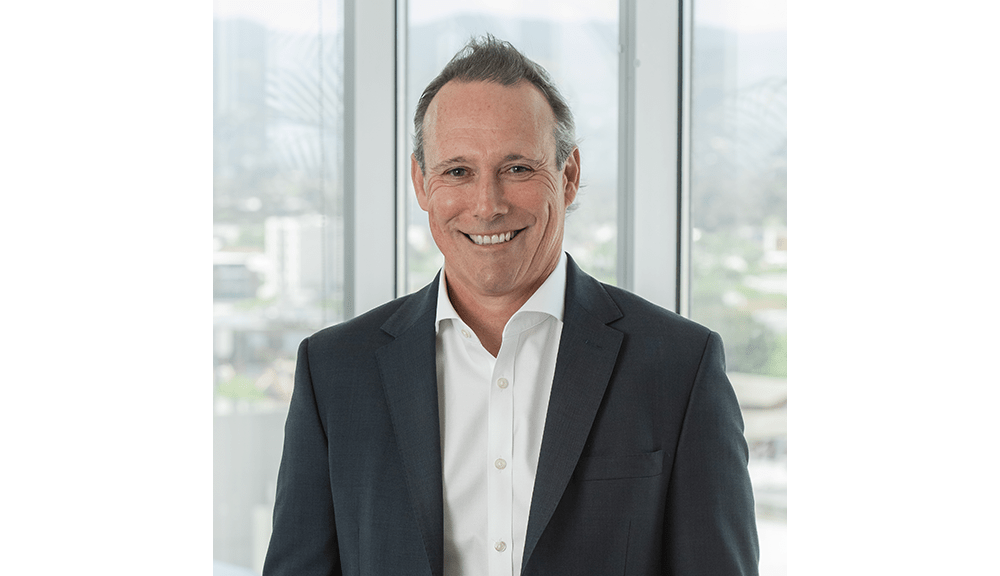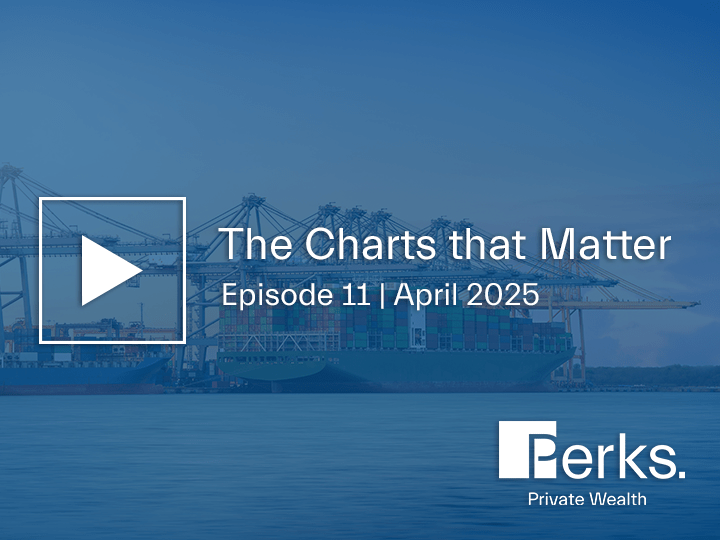Introduction
Simon Hele:
Hi everybody, and welcome to ‘The Charts that Matter’.
My name is Simon Hele, a Director and Advisor of Perks Private Wealth, and I’m joined today by Christo Hall. Christo is the Chair of our Investment Committee, and today I’m going to discuss with him our investment committee’s key thoughts on markets, what’s happened, and where we believe things are heading in the short to medium term.
For those that haven’t met Christo, Christo’s built a successful and highly respected career in the investment world, initially as an Investment Analyst at National Asset Management, before moving into portfolio management roles with Goldman Sachs JBWere and Argo Investments. He then went to Hong Kong as Senior Portfolio Manager and Managing Director of BlackRock, the biggest manager of money in the world, where he was part of the management team that oversaw $50 billion worth of assets. He then returned to Australia to become Chief Investment Officer for Ellerston Capital, better known as the Packer Family Office.
Welcome, Christo.
Christo Hall:
Thanks Simon. Pleasure to be here.
Q & A
Simon Hele:
Nine months ago, investors were getting 1% on bonds, a quarter of on term deposits. Growth assets such as property and equities were soaring. We were under the belief from the Reserve Bank that interest rates weren’t going to change until the back end of 2023 into 2024, but things changed very quickly in 2022. As of yesterday, the Reserve Bank lifted interest rates to 2.35 from a starting position only a few months back of 0.1.
We now expect interest rates to get to and exceed 3% by the end of the year.
So Christo, what impact has this changing interest rate environment had on markets?
Christo Hall:
So Simon, it’s been a really interesting period over the last nine months particularly. Prior to that, we had an environment for probably six or seven years where we’d been seeing a lot of deflation and rates just continue to move lower and lower. And what that did was it lifted the valuation multiples that the share market trades on. So, the market did particularly well. And at the same time the bond market did well because rates were continually being cut. So, the bond prices performed very, very well as inflation expectations continue to get continually watered down. But since COVID, that’s all changed. And the catalyst for that was the amount of stimulus that global central governments and banks spent on trying to get us out of the COVID, you know, the COVID scenario economically. And that $35 trillion of spend, the largest liquidity injection we’ve seen in history, resulted in asset prices being incredibly inflated. Multiples continue to move much higher on share valuations. And really, we’re now in a scenario whereby because of that, that liquidity, we now have a very, very serious inflation problem as demand for goods and services continue to run incredibly high. Now, as central banks have begun to raise rates quite aggressively in the last four to five months, that is having an impact on valuation multiples, both for the bond market and also for the equity market. And they are contracting now very, very quickly to deal with the new environment.
Simon Hele:
So if the markets are now pricing in better valuations for shares, is now the time to start pushing money into that asset class?
Christo Hall:
Not just yet. So, what’s happened is we’ve seen the valuation multiples contract, but what we haven’t seen yet is the earnings part begin to unwind and that’ll be the next leg.
We’re starting to see signs of that, even though the reporting season that we’ve just been through in Australia was quite robust. I think moving forward we’re going to see more and more companies begin to water down their profit forecasts for years, fiscal year 23 and 24, and that’s going to flow through to share market valuations and they’re not yet reflected in current share prices. In my view. That will probably happen more as we move towards the end of the year.
Simon Hele:
So, you’re saying patience is likely to be the key here. What can you tell us about the economic picture and outlook?
Christo Hall:
So the economic picture we’ve seen from the stimulus I mentioned before, we saw an explosion in economic growth immediately post COVID. So when COVID hit, we saw economic growth. It collapsed globally because of the lockdowns. Then we had that enormous stimulus that I mentioned before, which saw economic growth really accelerate to levels around 6% to 7% globally. And now we’re seeing all of that liquidity that the central banks put in is being withdrawn. So what’s happening is as a consequence of that, plus rising interest rates because of the demand that we saw from all that liquidity creation happening from, you know, particularly from consumers, that is starting to have a real impact that rising rate structure on demand. And so we think that we’ll start to see economies really begin to slow down going forward over the next 12 to 18 months. And certainly, the lead indicators we look at economically are all pointing to that around the world. It’s very, very clear. And those leading indicators normally lead the economy by around about 12 months. So they’re fairly accurate and they’re all heading South at a pretty decent rate.
Simon Hele:
So there’s a lot of talk about a recession in the US. Can you talk to us a little bit about that?
Christo Hall:
Yeah so the issue in the US particularly is the wages construct. And even though we’ve seen wages, wages pressure on the upside here, we’re starting to see that in the press a lot more. And the government’s obviously looking to push for minimum wage increases of just over 5% in the US. It’s much higher than that. They’re running at close to 10%, and a lot of that is to do with their labor structure. So that’s the first part. The wages side is causing real issues for the US economy there. And the other side of course, is that they’ve had a very, very strong US dollar currency and we know here that the Australian dollar has fallen to around about $0.68. That really helps you in exporting country because it improves your terms of trade in the US obviously with a very, very strong US dollar, it’s working the other way. It actually becomes a hindrance. And so again, economic activity slows down on the back of that. So the last piece to fall in the US is the consumer. The consumer has been holding up pretty well, but we’re seeing we’re now seeing signs of slowing consumption in the US. And I think ultimately that’s what’s going to really start to slow the US economy down to pretty much recessionary levels as we go through the next 12 to 18 months.
Simon Hele:
So Christo, if we look forward from here, what do you see is the most important issues to be watching?
Christo Hall:
So I think the key is to look at the magnitude of rate rises both in Australia and in the US and in fact Europe as well, because it’s not so much about the level, it’s how quickly we get there and the faster those rate rises, the more pronounced the effect. They are going to have on the economy, the slowdown. And that’s going to be the key because if we see the Reserve Bank and other central banks feel as though they’re not on top of the inflation reduction process, then rates are going to go much higher than what the Reserve Bank are thinking. And indeed what we’re seeing is investors and that will become even more problematic for valuations.
Simon Hele:
So then if you were to sum it up, what’s an investor to do at the moment?
Christo Hall:
So, I think what an investor needs to do is to still be a little bit patient, which is something we’ve been advocating to the clients of Perks. And that’s certainly been the right strategy. But I think we’re getting to the stage now where it is time to look at fixed interest. Certainly, the fixed interest market will start to stabilize before the equity market, it always has done historically. And I think that will be the same here. So, there’s some really, really good, fixed interest returns I think, which are now we haven’t seen in years, which are now looking quite attractive. For example, you can get a 12-month term deposit offering around 3.7, 3.8% will probably be 4% post the recent rate rise. So, we haven’t seen that in years. And that’s the same for obviously for bonds. The key is to stick to the quality and of the fixed interest curve. Don’t buy anything that’s deemed to be junk or low kind of credit rating quality. So that’s the bond market, the share market. I think we need to, we can, again, have more patience a few more months because as I mentioned earlier, the profitability of these companies I think is going to come under pressure. We haven’t seen that yet to the degree I think it’s going to happen. And these rising cost structures we’re seeing around the world are certainly going to affect profit margins for companies, including those in Australia, and that’s going to affect obviously the dividends and the company profits that are reported going forward.
Simon Hele:
And in property prices both commercially and homes.
Christo Hall:
Yes, so that’s really. So, we haven’t yet seen the commercial side of just yet. We are seeing the residential side beginning to correct now. So, all off a high base. So, I think national property prices are now off only around 2% to 3%. If I look at the markets, I’m expecting Sydney and Melbourne to be down from peak to trough around 10% to 15%. Adelaide won’t be so bad because it’s a different sort of market structure. I think probably 5% to 7% will be the sort of decline we see there. Commercial property will follow going forward and we need to be mindful of that. I think there’s still some valuation correction that needs to happen in that part of the market.
Simon Hele:
We’ve already seen it in the listed market.
Christo Hall:
We’ve already started to see that list of market and that will transfer itself over to the private asset market as well.
Simon Hele:
Excellent, thanks Christo and thanks everyone for joining us with ‘The Charts that Matter’.






